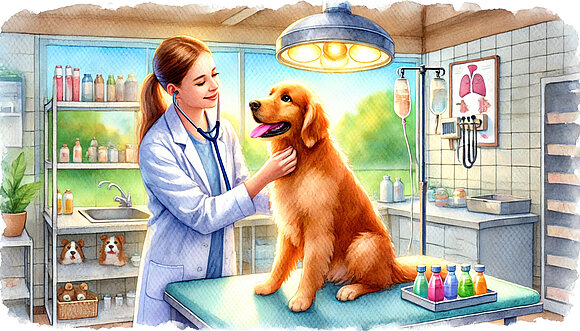The importance of regular visits to the vet for your dog

Early detection of diseases
One of the biggest benefits of regular visits to the vet is the early detection of diseases. Many health problems can be treated in the early stages if they are detected in time. Your vet can use simple examinations to detect diseases such as
- Heart disease: Listening to the heart can detect irregularities.
- Kidney and liver problems: Blood tests can detect early signs.
- Diabetes: A simple urine test can provide information.
- Cancer: Palpation and other examinations can detect tumors at an early stage.
Vaccinations and parasite control
Another important aspect is keeping your dog's vaccinations up to date and checking for parasites. Your dog needs regular vaccinations to be protected against diseases such as rabies, distemper and parvovirosis. Controlling and preventing parasites such as fleas, ticks and worms is also essential to keep your dog healthy.
- Vaccination schedule: Your vet will create an individual vaccination schedule for your dog.
- Parasite prophylaxis: Regular examinations and preventive measures prevent parasite infestation.
Dental and oral health
Your dog's dental health plays an important role in their general well-being. However, many dog owners overlook the care of their four-legged friend's teeth. Regular check-ups at the vet help to prevent dental problems such as tartar, gingivitis and tooth decay.
- Dental cleaning: Your vet can carry out professional dental cleanings.
- Dental care: You can also get tips and products for home dental care from your vet.
Weight control and nutrition
Obesity is a common problem in dogs and can lead to serious health problems. Regular visits to the vet will help you to keep an eye on your dog's weight and make dietary adjustments if necessary.
- Weight check: Your vet will weigh your dog at each visit and make dietary recommendations.
- Nutritional advice: Tips on a balanced and species-appropriate diet.
Age-appropriate care
As your dog gets older, his needs change. Regular visits to the vet are particularly important in order to recognize and treat age-related illnesses at an early stage. Your vet will help you to provide the best possible care for your senior dog.
- Senior check: Special examinations for older dogs.
- Adaptations: Tips on adapting diet and care.
Behavioral problems and training
Behavioral problems can also be a reason for a visit to the vet. Sometimes behavioral changes are due to health problems. Your vet can help you find the cause and take appropriate measures.
- Behavioral analysis: Examination for health causes.
- Training tips: Recommendations and possibly a referral to a behavioral therapist.
Conclusion
Regular visits to the vet are an essential part of preventive healthcare for your dog. They enable early detection and treatment of diseases, updating vaccinations, checking for parasites and monitoring dental health and weight. You will also receive valuable tips on age-appropriate care and how to deal with behavioral problems. Your vet is an important partner in ensuring the quality of life and well-being of your faithful companion. So, don't wait for the next emergency - schedule regular check-ups and keep your dog healthy and happy!
More articles for you
Dangerous encounter: What you should do if your dog is bitten by a snake
It's every dog owner's nightmare: you're out in nature with your four-legged friend, he's sniffing the ground curiously, and suddenly you hear a hissing sound. Before you know it, your dog flinches and you recognize the signs of a snake bite. But don't panic! In this article, you will learn how to…Read moreWhat you should know about cherries for dogs
You may have heard that cherries are good for your health. They contain lots of vitamins, antioxidants and fiber, which can strengthen the immune system and aid digestion. But are cherries also suitable for dogs? And if so, how much and in what form should you offer them to your four-legged friend?…Read moreWhat you should know about chocolate for dogs
Chocolate is a favorite treat for humans, but it can be dangerous for dogs. Why is this the case and what can you do if your dog has eaten chocolate? In this article you will learn more about the effects of chocolate on dogs and how you can help your four-legged friend.Read more


